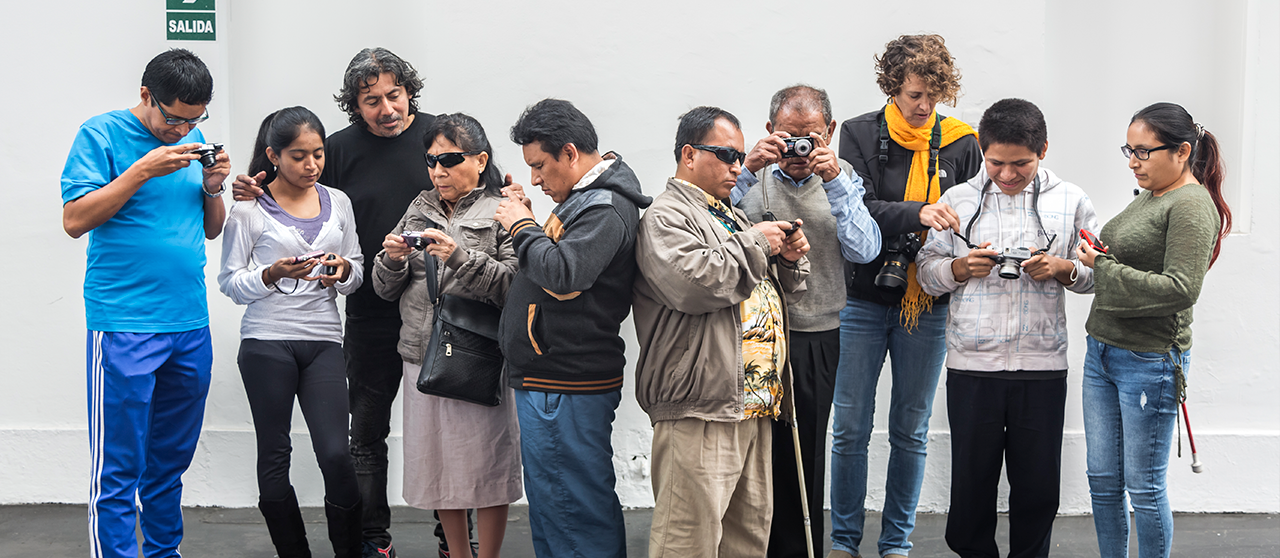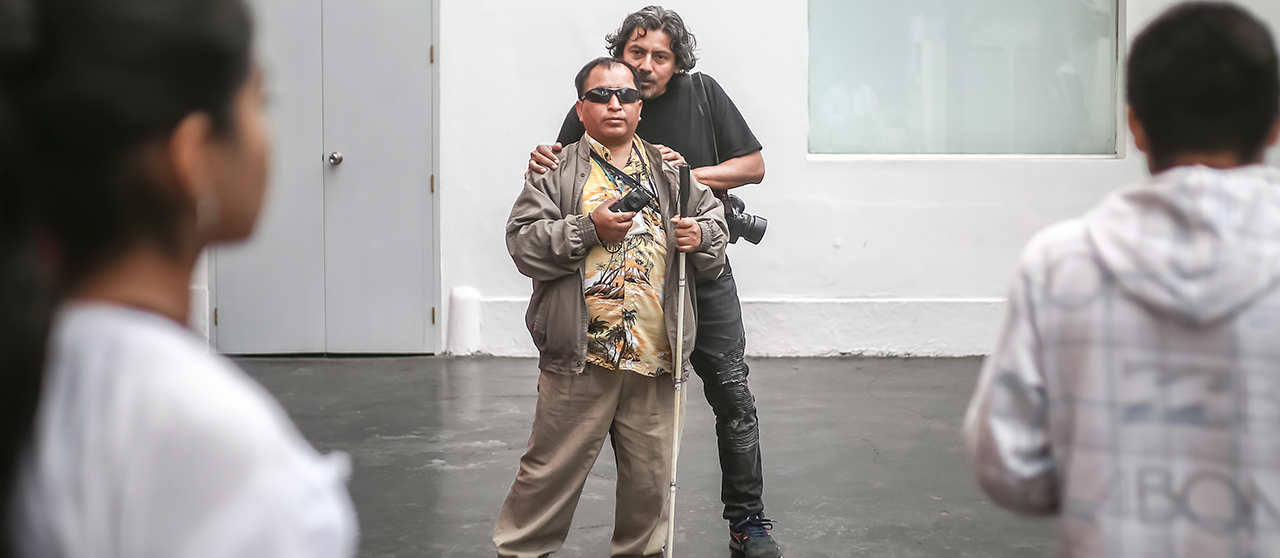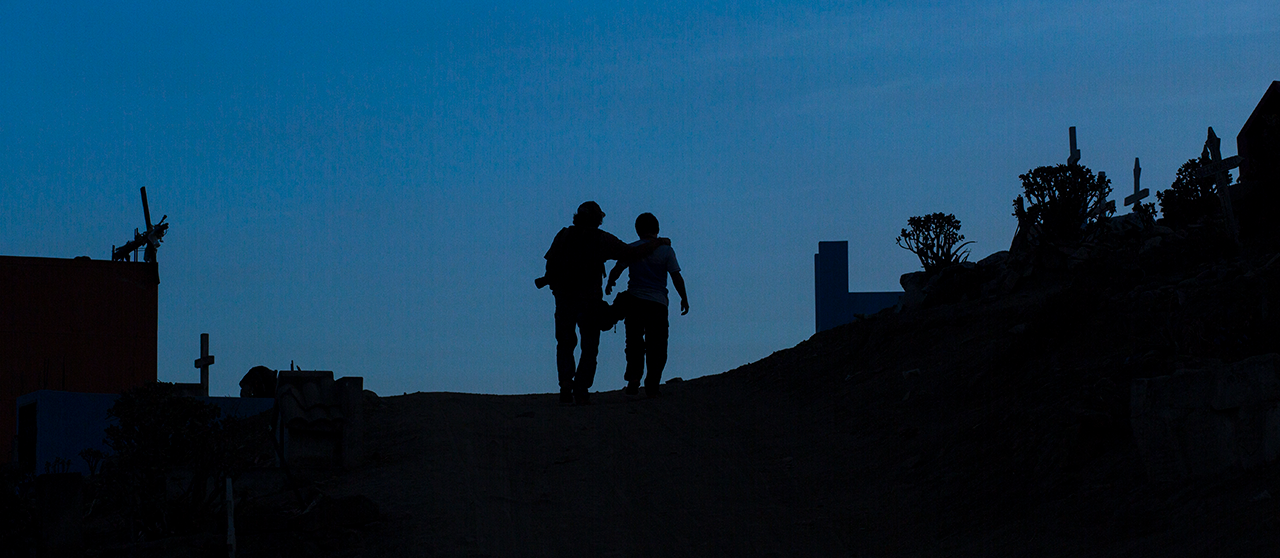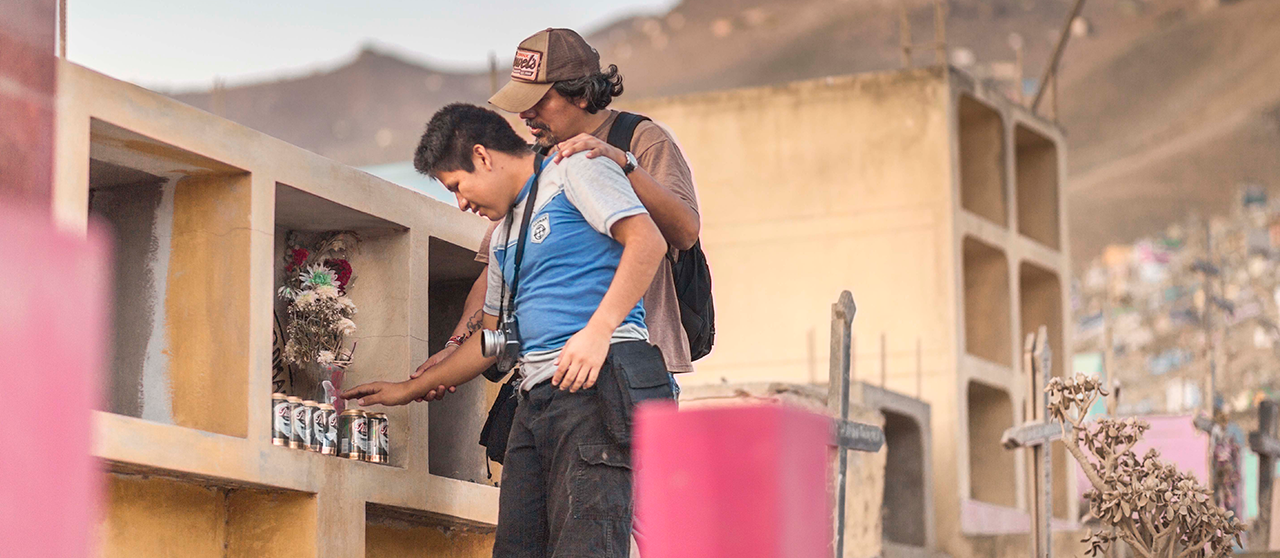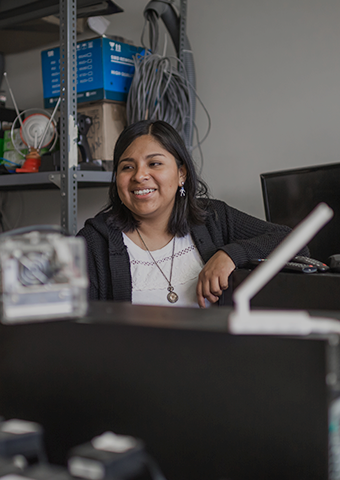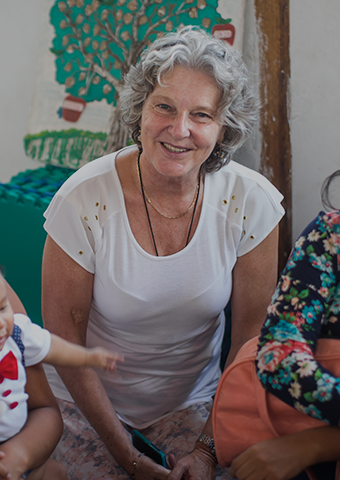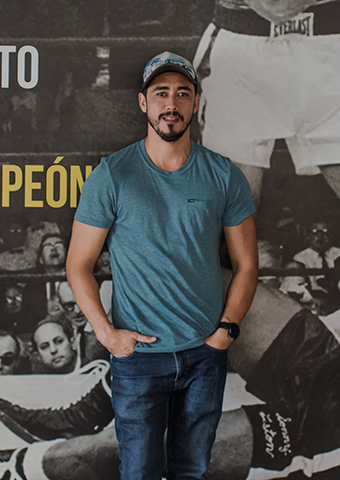“When they are standing in front of an image they do not see, I describe it for them; they imagine it and take the picture”
You met twelve years ago during a trip in Tingo María. You saw some kids playing ball in a town, but one was not playing. You approached him and realized he had vision problems.
Yes, that is right. I arrived to the community of Alto Pendencia by chance, a beautiful place in which I liked seeing children playing in the middle of the jungle. I was taking pictures of them, when I suddenly saw one on a corner. I approached him to ask him why he was not playing and, when I was close, I noticed one of his eyes was cloudy while the other was half cloudy. We started talking and then I asked him if I could meet his parents. He took me to his house, where I was told how he was losing his vision little by little.
You suggested them to take him to Lima so he could be treated.
Yes, I told them I could help, I could take him with me to perform a general check-up.
They doubted. They did not know you.
Of course. I gave them my number. They said they would call me, but after half a year nobody called, so I went back there…
Did you have to work there?
No, I went by my own.
Why?
I do not know if it is a problem. I get involved very much with the people I take photos of. I try to help them. That is how I have many friends now.
That is not so common, where did you get that vocation from?
I was taught that as a child. That happens in many houses! There is not much to eat, but if someone else arrives home, we share. My family taught me that and I am still like that. I share.
That was a good practice in your house.
My grandmother, my parents… they were always doing things like that. That is why I think is the most normal thing.
How long did it take for Nilton to travel and stay with you?
I travelled for a second time and Nilton’s mother told me they did not call because they did not know who I was or what could happen to Nilton. Besides, they did not have any money to send him or a family that takes him in. So, I spoke to my parents; I told them what I wanted to do and they were delighted; they wanted to take Nilton in. However, another year passed and they still didn’t come, so I travelled one more time.
You were determined to make it happen; you had to take Nilton to Lima no matter what!
That is right. I asked them what happened and they told me they could not send him alone, all the family had to go with him. I called home and I said, “They are five people”, my mom replied, “Ok, let’s have them over”. I bought the tickets and we travelled here. Nilton underwent all the check-ups.
The results were not good. The vision in his right eye was lost and the same was going to happen to the left eye. Two years had passed since you met him, Nilton was still able to see then?
No, he could only see sometimes when there was a lot of light. We were told we should have brought him before. As they were coming back to Tingo María, the doctor recommended to extract both eyes as a fungus could affect him there due to the lack of health care; the fungus could even affect his brain and that would be much worse ―however, his parent did not listen. They went back to their hometown; one day, his mother called to tell me Nilton was depressed. As he could not see anymore, he did not want to go out of the house, go to school or play with his friends. That is how Nilton started living with me. I signed him up in a school for blind children.
“The doctor recommended to extract both eyes as a fungus could affect him due to the lack of health care; the fungus could even affect his brain and that would be much worse”
He is 20 years old now and he is about to finish school. Some time ago, in a conversation, you heard about a blind photographer. He asked you then if you believed he could take pictures.
When he told me, “Hey, Paul, do you think I can take pictures?”, I said excited, “Of course, you can”. And I started teaching him, in my own way, everything I could. I gave him a camera and, through sounds, he learned to use the diaphragm.
He lost one sense, but trained the others.
There are some things I cannot hear and he does. Some time ago, when I was taking him to school in a taxi, he started asking me many things. “Is that a motorbike or a tuk-tuk?”, he asked, “A tuk-tuk”, I replied. “What brand is it?”, and named many brands. As I did not know that I started doing research to answer. But then, when I did answer him, he asked, “Does it have two or three strokes?”. I had to keep doing research, because he was recognising the types of motorbikes through their sound. The same happened with the cars. At the beginning, it was tiring for me, but then I realized it was very important for him to learn about everything.
Has that been helpful for him as photographer?
Pretty much. I would love to take the pictures the workshop students take, because their senses have an impact on their work.
You were invited to a photography class at the Pontifical Catholic University of Peru, as one of the students there is blind. She was the one who ask you to carry out a workshop.
Her teacher gave her my phone number and she called me. She came to my house and I explained her the way I was teaching Nilton. She did not want to work as photographer but, as she was studying Communications, she did want to learn to take photos; so, she asked me to carry out a photography workshop. She thought that ―just like her― there would be more people interested on it.
Now, you even have an 80-year-old student.
Yes, I do. Twenty people signed up. They were too many, so we had to choose ten.
What was the selection criteria?
Some people were only curious, but others really needed it. Moreover, some of them could afford a photography workshop.
What was important here was solidarity, as the ‘Centro de la Imagen’ (Peruvian Photography Institute) gave a space in their facilities, and some of your current and former students donated cameras which you gave to the workshop students. Your assistants are colleagues who also donated their time and talent.
Of course. A year and a half ago, the project was ready, we only needed cameras. A company gave me six cameras that were out-of-date and they were not going to sell. I was going to start just with that, but the director of the “Centro de la Imagen” gave me permission to use the institute facilities and, when the students found out there was going to be a workshop for blind people, they donated more cameras. It was awesome. As it was going to be difficult for me to teach ten blind people, I involved more photographers. I also selected them. I chose the friends who had more patience and time availability. 17 photographers, who were also good friends of mine, got involved in the process.
Their work is to assist them, be the students’ guides.
That is right. Fourteen classes were conducted ―seven in the classroom and the others on the street, so they could start telling their own stories through pictures. Each one of them has a story and the photographers were there to help them tell it. 5 of the 10 students proposed the same topic: the deficiencies in Lima for disabled people. One friend made me realize they wanted to show what it bothers them the most and the things nobody notices. It was a wakeup call.
What were other topics about?
Nilton wants to take pictures of people playing football in the mountains. Hugo Lastra wants to show the good things being done for blind people. The 80-year-old man wants to take pictures of landscapes; as he has a 90% visual impairment, he wants to show people how he sees things.
Those are the topics any good photographer would exhibit.
Right.
“The 80-year-old man wants to take pictures of landscapes; as he has a 90% visual impairment, he wants to show people how he sees things”
How do you feel?
Well, I am full of energy when I am with them… I miss them.
You miss them because the classes are over and they are currently working on their own projects.
Yes, that is right. They have to present the first pieces of work this month. ICPNA has given us a hall in its Lima’s Downtown facility to exhibit our photographs next February.
Everything started like a game.
Yes, it did. Sometimes I do not realize the things I do. And that is great. Many people have congratulated me; however, this is all normal for me.
You always saw those kinds of actions in your parent’s house.
That is true! In fact, if we did something we like to do and share it, this world would be a little different!"


